The Complete Ojakhuri Guide: Master Georgia's Ultimate Family Meal
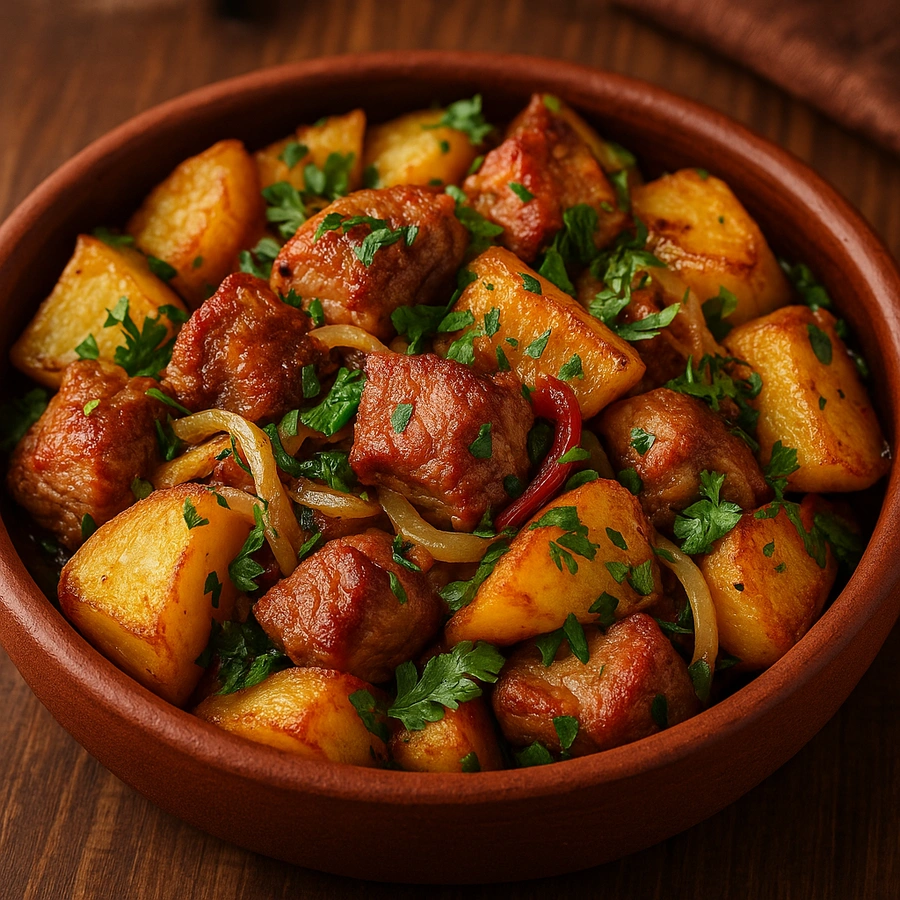
Discover everything you need to know about Ojakhuri - from traditional recipes to modern variations, cooking techniques, and perfect pairings.
What is Ojakhuri? The Heart of Georgian Home Cooking
Ojakhuri (ოჯახური) literally translates to "family meal" in Georgian, and there's no dish that better embodies the warmth and comfort of Georgian hospitality. This hearty combination of perfectly seasoned meat, golden potatoes, and caramelized onions has been bringing Georgian families together around the dinner table for generations.
Unlike many Georgian dishes that originated in specific regions, Ojakhuri belongs to every Georgian household. It's the dish that mothers teach their children, that connects diaspora Georgians to their homeland, and that introduces visitors to the soul of Georgian cuisine.
Why Ojakhuri Matters:
- Comfort food at its finest - Simple ingredients transformed into something magical
- Family bonding - Traditionally cooked together and shared from one large pan
- Versatile foundation - Endless variations while maintaining its essential character
- Cultural significance - Represents Georgian values of hospitality and family unity
The Traditional Ojakhuri Recipe
Ingredients (Serves 4-6)
For the Meat:
- 1.5 lbs (700g) pork shoulder or beef chuck, cut into 2-inch cubes
- 2 tablespoons vegetable oil
- 1 teaspoon salt
- 1/2 teaspoon black pepper
- 1 bay leaf
For the Potatoes:
- 2 lbs (1kg) medium potatoes, peeled and quartered
- 3 tablespoons vegetable oil
- 1 teaspoon salt
For the Onions:
- 3 large yellow onions, sliced into half-moons
- 2 tablespoons butter
- 1/4 teaspoon salt
For Finishing:
- 2 cloves garlic, minced
- 1/4 cup fresh cilantro, chopped
- 2 tablespoons fresh parsley, chopped
- Salt and pepper to taste
- Optional: 1 tablespoon white wine or beer
Step-by-Step Instructions
1. Prepare the Meat (20 minutes)
- Heat oil in a large, heavy-bottomed pan or cast iron skillet over medium-high heat
- Season meat cubes with salt and pepper
- Brown meat on all sides until deep golden (don't overcrowd the pan)
- Add bay leaf and reduce heat to medium-low
- Cover and cook for 15-20 minutes until tender
- Remove meat and set aside, keeping the pan drippings
2. Cook the Potatoes (15 minutes)
- In the same pan with meat drippings, add more oil if needed
- Add quartered potatoes in a single layer
- Season with salt and cook without stirring for 5-7 minutes
- Flip and cook another 5-7 minutes until golden and crispy outside, tender inside
- Remove potatoes and set aside
3. Caramelize the Onions (12-15 minutes)
- Add butter to the same pan
- Add sliced onions and salt
- Cook over medium heat, stirring occasionally
- Let onions slowly caramelize to deep golden brown (this is crucial for flavor)
- Don't rush this step - properly caramelized onions make all the difference
4. Bring It Together (5 minutes)
- Return meat and potatoes to the pan with onions
- Add minced garlic and gently fold everything together
- Cook for 2-3 minutes until heated through
- Add wine or beer if using (it will sizzle and steam)
- Remove from heat and sprinkle with fresh herbs
- Taste and adjust seasoning
5. Serve Georgian Style
- Serve immediately in the cooking pan or transfer to a large serving platter
- Provide spoons for communal sharing
- Accompany with Georgian bread and perhaps some pickled vegetables
Regional Variations Across Georgia
Kakheti Style Ojakhuri
From Georgia's wine region
- Key difference: Uses local wine in cooking
- Special ingredients: Add 1/4 cup dry red wine during final cooking
- Serving style: Often paired with local cheese and fresh herbs from family gardens
Svaneti Mountain Ojakhuri
From the high mountain region
- Key difference: Uses Svaneti salt (with local herbs and spices)
- Special ingredients: Replace regular salt with Svaneti salt blend
- Texture: Often cooked with slightly more oil due to cold mountain climate
Western Georgian Ojakhuri
Influenced by the coastal regions
- Key difference: Sometimes includes bell peppers
- Special ingredients: Add 1 diced red bell pepper with the onions
- Flavor profile: Slightly sweeter due to the peppers
Tbilisi Urban Style
Modern city adaptation
- Key difference: Often includes mushrooms
- Special ingredients: Add 200g sliced mushrooms after the onions
- Appeal: Popular in restaurants and modern Georgian homes
Mastering the Three Components
Perfect Ojakhuri Meat
Best Cuts to Use:
- Pork shoulder - Traditional choice, rich flavor, stays tender
- Beef chuck roast - Hearty alternative, needs slightly longer cooking
- Lamb shoulder - Less common but delicious, especially in mountain regions
- Mixed meats - Some families use both pork and beef
Meat Cooking Secrets:
- Don't skip browning - This creates the flavor foundation
- Keep pieces uniform - Ensures even cooking
- Low and slow - Rush the meat and it becomes tough
- Save the drippings - They're liquid gold for cooking the potatoes
Golden Perfect Potatoes
Potato Selection:
- Best varieties: Yukon Gold, Russet, or any medium-starch potato
- Size matters: Quarter large potatoes, halve medium ones
- Avoid: Waxy potatoes that won't get fluffy inside
Potato Technique:
- Single layer cooking - Don't overcrowd or they'll steam instead of fry
- Patience pays - Let them develop a crust before flipping
- Season while hot - Salt adheres better to warm potatoes
- Texture goal - Crispy outside, fluffy inside
Caramelized Onion Mastery
Onion Secrets:
- Yellow onions work best - They caramelize beautifully
- Slice consistency - Half-moon slices about 1/4 inch thick
- Heat control - Medium heat prevents burning while allowing caramelization
- The waiting game - True caramelization takes 12-15 minutes minimum
Modern Variations for Today's Kitchen
Vegetarian Ojakhuri
Replace meat with:
- Large chunks of portobello mushrooms
- Firm tofu or tempeh, well-seasoned and browned
- Mixed mushroom varieties (cremini, shiitake, oyster)
- Cooking tip: Add umami with soy sauce or mushroom broth
Healthy Lightened Version
Modifications:
- Use sweet potatoes instead of regular potatoes
- Reduce oil by using non-stick pan and cooking spray
- Add bell peppers and zucchini for extra vegetables
- Use lean cuts like pork tenderloin
Quick Weeknight Ojakhuri
Time-saving tricks:
- Pre-cut and season meat the night before
- Use small potato cubes for faster cooking
- Cook in a large wok for quick, high-heat cooking
- Total time: 25 minutes instead of 45
Elevated Restaurant Style
Gourmet touches:
- Finish with a splash of Georgian wine
- Garnish with pomegranate seeds and fresh dill
- Serve with a dollop of matsoni (Georgian yogurt)
- Add a sprinkle of sumac for color and tang
Perfect Pairings: What to Serve with Ojakhuri
Traditional Georgian Accompaniments
Essential Sides:
- Georgian bread (shotis puri or other traditional breads)
- Pickled vegetables (jonjoli, pickled cabbage, or mixed pickles)
- Fresh herbs (cilantro, parsley, tarragon)
- Georgian cheese (sulguni or imeruli cheese)
Wine Pairings
Georgian wines that complement Ojakhuri:
- Red wines: Saperavi, Mukuzani (for meat-heavy versions)
- White wines: Rkatsiteli, Kisi (for lighter versions)
- For non-Georgian wines: Pinot Noir, Côtes du Rhône, or Chianti
Complete Meal Ideas
Family Dinner Menu:
- Start with Spinach Pkhali
- Main course: Ojakhuri with fresh bread
- Finish with Churchkhela or Georgian honey cake
Casual Entertaining:
- Appetizer: Mixed Georgian pickles
- Main: Ojakhuri with beer or wine
- Dessert: Fresh fruit and Georgian cheese
Troubleshooting Common Ojakhuri Problems
Problem: Meat is Tough
Solutions:
- Cut meat against the grain
- Cook longer at lower heat
- Choose fattier cuts like pork shoulder
- Don't skip the browning step
Problem: Potatoes Fall Apart
Solutions:
- Choose firmer potato varieties
- Don't overcook in the initial frying stage
- Handle gently when combining ingredients
- Let potatoes cool slightly before mixing
Problem: Onions Burn Instead of Caramelize
Solutions:
- Lower the heat to medium or medium-low
- Add a splash of water if they start to stick
- Stir more frequently
- Be patient - good caramelization takes time
Problem: Dish Lacks Flavor
Solutions:
- Season each component separately
- Don't skip the garlic at the end
- Use enough salt throughout the process
- Add fresh herbs for brightness
Storage and Reheating Tips
Proper Storage
- Refrigerator: Store in airtight container for up to 3 days
- Freezer: Can freeze for up to 3 months (potatoes may change texture slightly)
- Portioning: Consider freezing in family-size portions
Best Reheating Methods
- Stovetop: Heat in skillet with a little oil, stirring gently
- Oven: Cover and reheat at 350°F for 15-20 minutes
- Microwave: Use 50% power to prevent overcooking
- Pro tip: Add fresh herbs after reheating for best flavor
Cultural Context: Ojakhuri in Georgian Life
Family Traditions
Ojakhuri represents more than just food in Georgian culture. It's often the first dish children learn to help prepare, with each family passing down their particular techniques and variations. The communal cooking process - browning meat, frying potatoes, caramelizing onions - creates natural opportunities for conversation and bonding.
Special Occasions
While Ojakhuri is considered everyday comfort food, it also appears at celebrations and gatherings. Its ability to feed a crowd and improve with larger quantities makes it perfect for extended family dinners and informal entertaining.
Modern Georgian Cuisine
Today's Georgian chefs are elevating Ojakhuri in restaurants worldwide, but the heart of the dish remains unchanged: quality ingredients, proper technique, and the warmth of sharing a meal with others.
Your Ojakhuri Journey: Next Steps
Master the Basics First
Before trying variations, perfect the traditional recipe. Focus on:
- Proper meat browning technique
- Achieving golden, crispy potatoes
- Patience with onion caramelization
Experiment with Confidence
Once comfortable with the basics, try:
- Different meat combinations
- Regional variations
- Your own family touches
- Seasonal ingredient additions
Share Your Success
Ojakhuri is meant to be shared. Invite friends and family to experience this cornerstone of Georgian cuisine, and don't be surprised if it becomes their new favorite comfort food.
Related Georgian Recipes to Try Next
If you love Ojakhuri, you'll also enjoy:
- Mtsvadi - Georgian grilled meat skewers, perfect for outdoor cooking
- Chakapuli - Herb-rich Georgian stew that pairs beautifully with bread
- Lobiani - Georgian bean-filled bread, excellent as a side dish
- Tkemali Sauce - Traditional Georgian plum sauce that complements any meat dish
- Spinach Pkhali - Fresh appetizer that balances Ojakhuri's richness
Create a complete Georgian feast: Start with Pkhali, serve Ojakhuri as the main course with fresh bread, and finish with traditional Georgian sweets.
Have you tried making Ojakhuri? Share your variations and family traditions in the comments below. For more authentic Georgian recipes and cooking tips, subscribe to our weekly newsletter and join our growing community of Georgian cuisine enthusiasts.
Comments And Questions
Search Recipes
Related Recipes
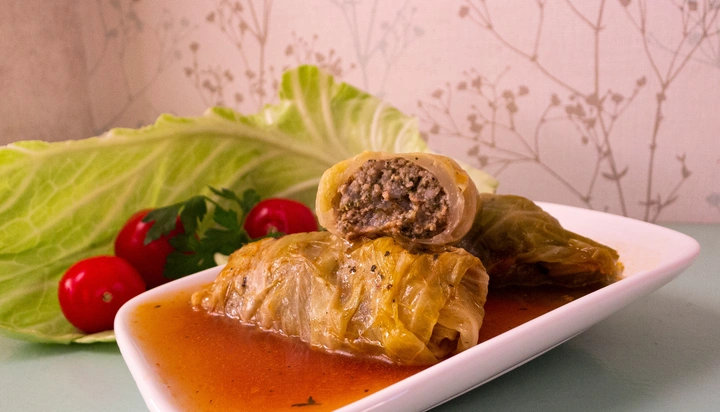
Tolma
Tolma is very popular dish throughout the Caucasus region and of course In Georgia. Tolms is often served for special o…
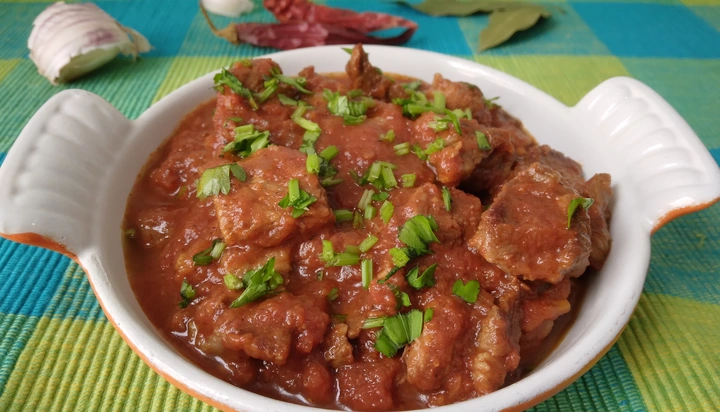
Beef Stew With Tomatoes
Beef stew with tomatoes is very tasty and easy to made dish. Use tender meat and fresh tomatoes for the best result.
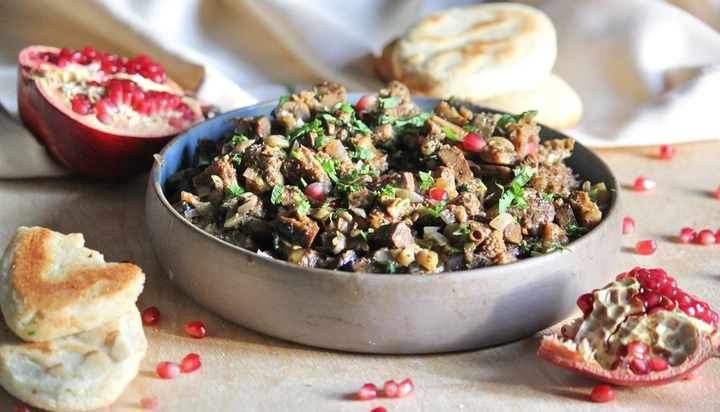
Kuchmachi
Kuchmachi is a traditonal dish from Western Georgia. It's made with internals (heart, lungs, gizzards, liver, kidneys,…
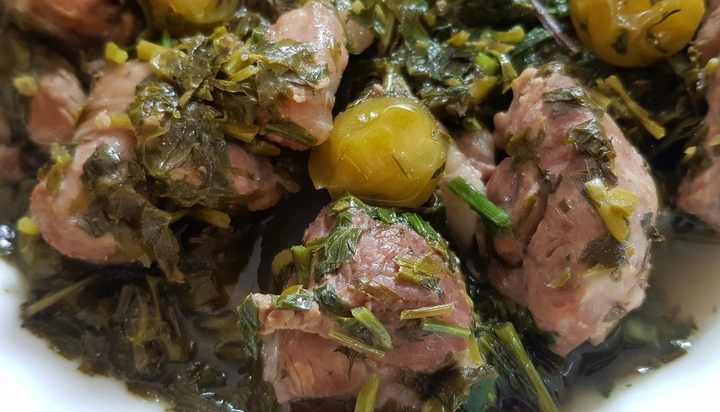
Chakapuli
lamb stew with herbs and wine is a dish that should be on the Georgian Easter table. Chakapuli is traditionally made w…